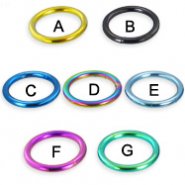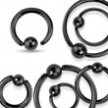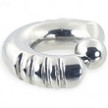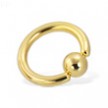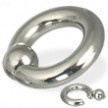Titanium anodized segment ring, 12 ga
- Diameter: 1/2" (13mm)
- Gauge (Thickness): 12 (2.0mm)
- Material: titanium coated 316L surgical stainless steel
- Type: captive bead ring
- -: priced and sold individually
| Click on the picture to see a big picture and description of the body jewelry you are interested in. | |||||||||
|---|---|---|---|---|---|---|---|---|---|
|
Black stainless steel captive bead ring...
$4.99
Black stainless steel captive bead ring with one sided fixed ball, 18 ga
|
Fancy 4 notch captive bead ring,...
$14.99
Fancy 4 notch captive bead ring, 0 ga
|
Gold Tone Captive Bead Ring, 10...
$7.49
Gold Tone Captive Bead Ring, 10 Ga
|
Spring ball captive bead ring, 2...
$18.49
Spring ball captive bead ring, 2 ga
Shown: 16mm captive bead ring. |
||||||
NAVEL PIERCINGS
Initial jewelry: Captive bead rings, bead rings, circular barbells in 14 to 10ga and usually 7/162 to 1/22 in diameter; rarely as thin as 16ga and as small in diameter as 3/82. A ring which is too small in diameter will constrict the piercing and cause the entrances of the piercing to migrate to conform to the tight curvature of the ring. Curved barbells (1/4 of a circle) in 14 to 10ga and 3/8» to 5/82 in length. Teardrop and oval rings may also be worn when less extruding jewelry is desired.
The shape of the navel varies from person to person. Not all navels can be successfully pierced. An «innie» navel with a distinct ridge or lip is most likely to be pierced successfully. Navels lacking a distinct ridge often cannot support a piercing and the piercing migrates or rejects. The upper ridge is usually more prominent than the lower ridge. Often there is a natural indentation or slight wrinkle where the piercing is made. The entrances of the piercing should be placed equidistant from the edge of the ridge to make the piercing as perpendicular to the tissue as possible.
The navel should be examined for suitability and measured before the jewelry is selected. Placement of the piercing should be determined after examining the navel in different body positions. The dimensions of the jewelry should be chosen after measuring the width of the piercing. Often the navel ridge will stretch and flatten when the piercee reclines. No more than 1/3 of the ring should be through the piercing. If a curved barbell is chosen it should be at least 1/8» longer than the width of the piercing.
A curved barbell is recommended if the piercee's waist folds at the navel when he/she is sitting. In this case a ring would be forced to one side causing the piercing to heal crookedly and scar. A curved barbell is also recommended if the navel ridge is not distinct or if the ridge flattens or inverts when the piercee reclines. If the ridge is not distinct the width of the piercing often exceeds ½» and requires a ring of an uncomfortably large diameter. A curved barbell provides a non-constrictive curvature.
Although the navel piercing is one of the most popular piercings it can be one of the most difficult to heal. Wearing tight waistbands or frequent activity involving bending at the waist can prolong healing time. The pressure of waistbands will force the ring to one side causing the piercing to heal crookedly and scar. Too much pressure can cause the piercing to migrate or reject completely. A navel piercing performed at 14ga may heal without incident if waistbands are avoided during healing but may begin to migrate when the wearer resumes wearing very tight waistbands across the piercing.
Some women have successfully worn navel piercing jewelry throughout pregnancy.
In other cases, the navel ridge pops out, making the jewelry uncomfortable. Monofilament nylon or teflon is a more flexible option to metal jewelry. A piercing that has been completely healed for several years will most likely remain open if the jewelry is not worn; it will shrink, necessitating the aid of an insertion taper to install the original jewelry.
The «outie» is a remnant of the umbilical cord which is connected to the interior of the abdomen and internal organs. If an «outie» piercing were to become infected, the infection could travel to the interior of the abdomen or internal organs.
The Navel Piercing - A Better Alternative
During the last few years I have observed an alarming number of navel piercings struggling to heal. Most problems result from jewelry that is too small causing stress to the openings of the piercing. I have seen navel piercings with 3/8» - ½» rings containing ½» - ¾» of tissue. It would be obvious if a nipple or other piercing contained too much tissue for the jewelry; but the navel is less obvious. It is not uncommon for navels pierced with a ring to suffer through 6-18 months of healing time.
We have all seen irritated and inflamed navel piercings; many develop discolored and hardened tissue around the openings. Some migrate and/or «grow out.» This happens because the jewelry is too small and needs to move through the tissue to a position where it is no longer under stress. Removing the ring and replacing it with a Curved Barbell has always solved these problems, usually within days. A Curved Barbell allows the body to move naturally without stress to the piercing and will not cause any of the undesirable effects associated with the use of a ring.
Having worked in a high volume studio for over 5 years, I had the opportunity to gain much insight into problems associated with piercings. I have come to the conclusion that a Curved Barbell is the best initial jewelry for optimum comfort and healing. Navels pierced using a Curved Barbell generally heal in 3-4 months.
People usually associate rings with navel piercings, but when they are made aware that the healing time is greatly reduced with virtually no chance of any irritation or scarring, they are usually happy to start with Curved Barbells. After the jewelry is inserted, they also like the look.
This is a shift in thinking for all of us (piercers and piercees), but the overall benefits become obvious after a few piercings.
